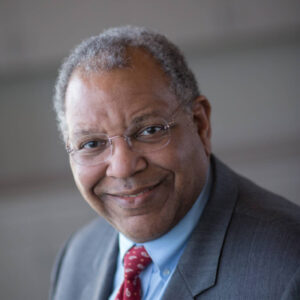Charles Aubrey “Mickey” LeMaistre, a former president of MD Anderson Cancer and a pioneer of cancer prevention, died Jan. 27. He was 92.
LeMaistre combined his extraordinary skill as a physician, educator and academic administrator with a confident and charismatic style to become one of the giants of medicine. He touched history in being one of the early visionaries in the field of cancer prevention and control and public health oncology.
He was a force in medical education and an architect of the modern-day MD Anderson Cancer Center. On a more personal note, Mickey was a mentor and a friend to many of us in medicine, especially oncology.
Mickey LeMaistre was born in 1924 in the deep south, or as he used to say “the very deep south.” He was from Lockhart, AL, which was a small lumber mill town of about 1,000 people near the Gulf Coast.
He went to college at the University of Alabama and medical school at Cornell. After graduating, he trained in internal medicine at New York Hospital and completed a fellowship in infectious disease, specializing in tuberculosis. He served in the Epidemic Intelligence Service of the U.S. Public Health Service. It was during this period, in the early 1950’s, that he developed a lifelong interest in disease prevention.
LeMaistre was recruited to Emory University in 1954. There, he established one of the early departments of preventive medicine. In 1959, he was named a professor at the University of Texas Southwestern Medical School.
In 1962, U.S. Surgeon General Luther Terry appointed him to a 10-member Surgeon General’s Advisory Committee on Smoking and Health.
This group would publish the landmark 1964 Surgeon General’s Report on Smoking and Health. This report was not the first to find that cigarette smoking caused cancer, but its process, objective interpretation of science and the political savvy of those involved resulted in the wide acceptance of the fact. For the rest of his life, LeMaistre would be a force in the field of tobacco control.
LeMaistre became an administrator at UT Southwestern and then, from 1969 to 1978, Chancellor of University of Texas System. There he would catalyze the building of medical schools at the University of Texas San Antonio and University of Texas at Houston.
In 1978, LeMaistre would be named president of the M.D. Anderson Cancer Center in Houston. It would be a period of extraordinary growth for Anderson as his visionary leadership moved it into the modern era. He was a champion of multidisciplinary care. His interest in prevention of disease continued.
He was instrumental in creating the Division of Cancer Prevention and Population Sciences at MD Anderson. Over the past three decades, this department has made important contributions in epidemiology, behavioral science and clinical cancer prevention.
His legacy is that of public health leader, educator and mentor. “Dr. LeMaistre was a visionary leader whose impact on tobacco control and cancer prevention will continue to have an impact for many years,” said Bernard Levine, professor emeritus at MD Anderson and former vice president and head of the Division of Cancer Prevention and Population Sciences at that institution.
While president of MD Anderson, LeMaistre continued to contribute to other organizations. He chaired the 1981 National Conference on Smoking or Health, which is run by a coalition of 21 organizations, and in 1985 he chaired the International Summit on Tobacco Control. In 1986, he was the national president of the American Cancer Society. He was awarded the American Cancer Society Medal of Honor for his contributions.
“Mickey LeMaistre made many important contributions to medical science. We, who had the privilege of working directly with him, admired his graciousness, visionary leadership and, in particular his determination to advance the field of cancer prevention and particularly, tobacco control,” Levine said.
I first met, LeMaistre when I was working in the NCI Division of Cancer Prevention and Control nearly 25 years ago. He was funny, witty, warm, charismatic. Over the years, he would become a friend and mentor, he would encourage me to have scientific discipline, to interpret science objectively. He would be an example of a real caring clinician. Just a couple months ago, he called to discuss a patient he and I had referred to MD Anderson several years ago.
Perhaps the best summation of the contributions of this wonderful man comes from Ernest Hawk, the current vice president and Division Head at the Division of Cancer Prevention & Population Sciences and Boone Pickens Distinguished Chair for Early Prevention of Cancer:
“The cancer prevention community is forever indebted to Dr. LeMaistre for his unwavering vision of a world without cancer, for his immeasurable impact on tobacco control, and for his pioneering leadership in prioritizing cancer prevention at MD Anderson and more broadly among the nation’s cancer centers. But more than this, he will be remembered for the grace and compassion he showed towards all he knew and worked with…patients, faculty, staff, professional colleagues, students, and friends – both old and new. He had the rare ability to make someone feel as if they were the only person in the room. His humbleness and generosity have shaped the culture of our field as much as his work has advanced it. I am better, both personally and professionally, for having known him and feel tremendously honored to lead the division that he founded. It is my hope that we in the prevention community continue to build on Mickey’s achievements and dedicate ourselves to finding ever more impactful ways to realize his vision.”
Charles Aubrey LeMaistre is survived by his wife, Andreae. Other survivors are four children from his first marriage to Joyce, who died Dec. 5, 2003, six grandchildren and three great-grandchildren. They include two sons, C. Frederick LeMaistre, of Nashville and William S. LeMaistre of Houston; two daughters, Anne Philo LeMaistre of Austin, and Helen Meyer of San Antonio.












